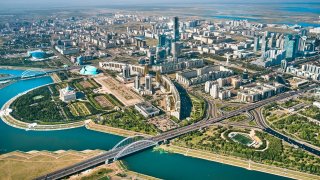How to Win the New Great Game in Central Asia
The United States and Europe can and should facilitate Central Asian regional integration and development.
In the nineteenth and early twentieth century, during the “Great Game” between the Russian Empire and British Empires, Central Asia was divided into spheres of influence. Five of the modern “stans” were under St. Petersburg’s control. The Emirate (then Kingdom) of Afghanistan was neutral. Pakistan was then a series of provinces in British India.
The fall of the Soviet Union granted the five Central Asian States independence a little over thirty years ago. The region was largely ignored by the world’s great powers, even though its southern neighbor, Afghanistan, was the theatre of NATO’s twenty-year war.
However, geopolitics and geoeconomics have changed since then. The five countries have come of age, both domestically and regionally, working together to unleash the region’s potential as a key mineral and infrastructural hub for energy security and global trade. The region has close historical ties to Russia and is positioned along China’s Belt and Road. Still, it also offers significant opportunities for U.S. and European companies to access the key precious metals for the energy transition.
Consequently, the region has seen a steep change in engagements, with frequent gatherings of heads of state, visits by foreign ministers, and an unprecedented number of bilateral agreements signed, vying for access to this new prime geopolitical and economic real estate. But it was the chaotic withdrawal from Afghanistan and the invasion of Ukraine in February 2022 that caused a foreign policy pivot in Western capitals to begin in earnest.
David Cameron’s visit to the region last month made him the first UK foreign secretary ever to arrive in Kyrgyzstan, Tajikistan, and Turkmenistan. This is an acknowledgment in London that the area has changed and is critical to Europe’s security and prosperity. Coinciding with Cameron’s visit in April, the Italian government hosted the President of Tajikistan, Emomali Rahmon, in Rome.
Cameron is choosing, like he has done with Gaza, to play his hand and leverage British influence to build key relationships: “We live in a contested, competitive world. If you want to protect and promote British interests you need to get out there and compete,” he told local journalists.
The economic axis of the agreement Cameron has struck will deliver access for the region to UK trade, security, and expertise. British firms are already upgrading the region’s water infrastructure by developing hydroelectric projects, and £50 million in development spending is planned. This spending is tied together with schemes designed to promote English language education and scholarships to bring the best students to British universities.
The core of a long-term economic partnership will be the supply of critical rare earth metals. Western investment and businesses in the joint development of this resource extraction will allow more diversified access to raw materials at a better price. Opening routes to the market offers Central Asia the possibility of unlocking unprecedented levels of international investment.
The democratic world has an opportunity to cement this relationship by assisting in the development of a regional economic and political community that guarantees mutual long-term security and prosperity.
This regional community should include, in the long term, the two final “Stans,” Afghanistan and Pakistan, which would open up routes for a “southern corridor” to a deep warm-water port in the Arabian Sea, integrating the landlocked nations of the continent’s center within the global maritime economy. It would also offer Afghanistan a proper future, with economic and political integration with its neighbors. That is the only way to ensure that Afghanistan doesn’t become an exporter of terrorism again. Crucially, regionalism will prevent Russia from realizing its nineteenth-century ambitions for a southern corridor to the Persian Gulf.
Policymakers in Washington, London, and Brussels must therefore leverage their expertise and help the seven “Stans” come together more formally with the establishment of a regional “S7 Union,” backed by a S7 Infrastructure and Investment Bank and S7 Critical Minerals Authority.
A stronger multilateral organization would facilitate dialogue and turn the region into a legally and regulatorily independent bloc, able to represent its own interests more effectively. It would also bring stronger institutions and security to an area with historic socio-economic unrest and shared counter-terrorism needs. Above all, such policies will bring more stability and prosperity and promote the development of a key trading partner for the strategic goods of tomorrow.
Dr. Azeem Ibrahim OBE is Senior Director at the New Lines Institute for Strategy and Policy in Washington DC and author of Authoritarian Century: Omens of a Post-Liberal Order (Hurst:2023). Follow him on X: @AzeemIbrahim.
Image: Andrey Yershov / Shutterstock.com.

